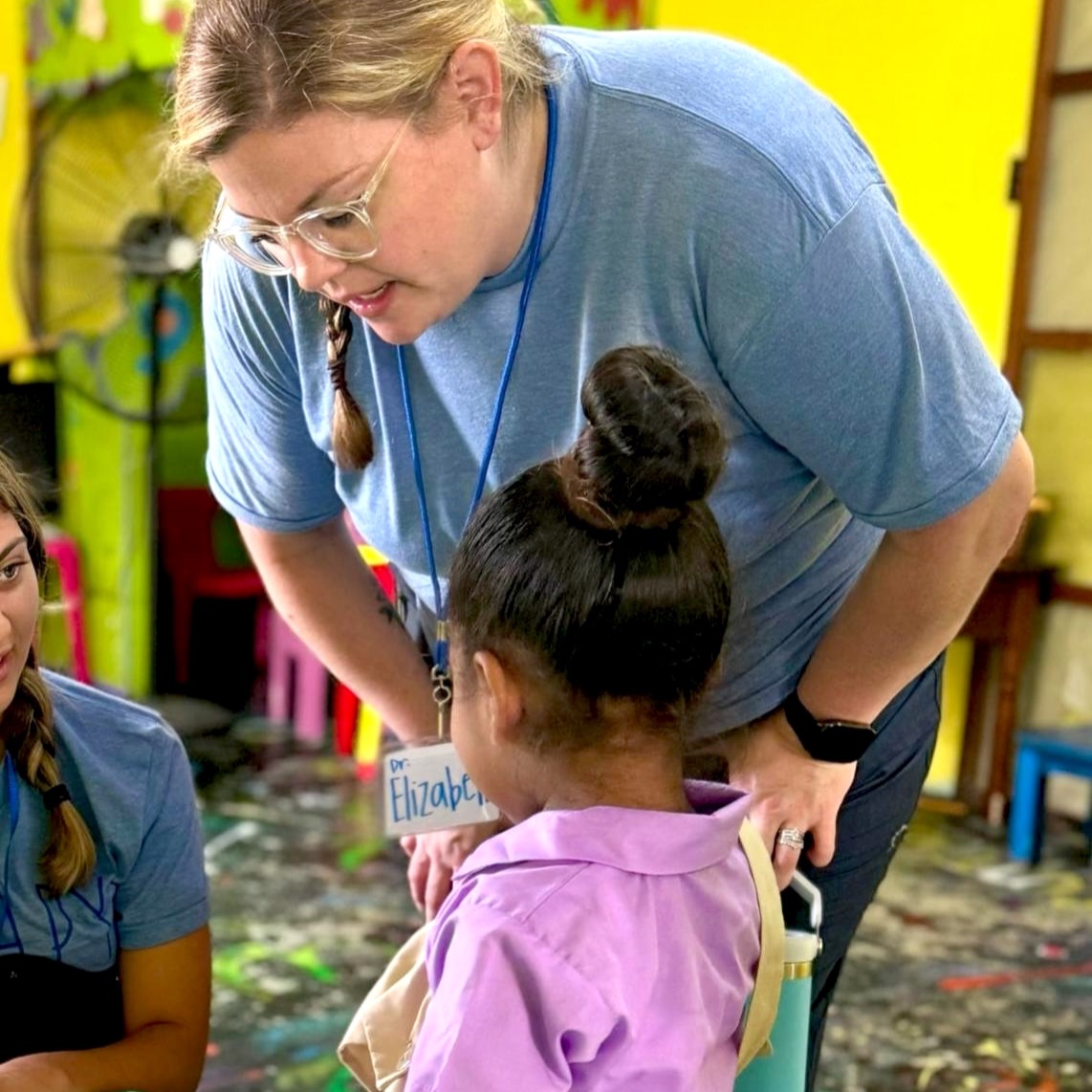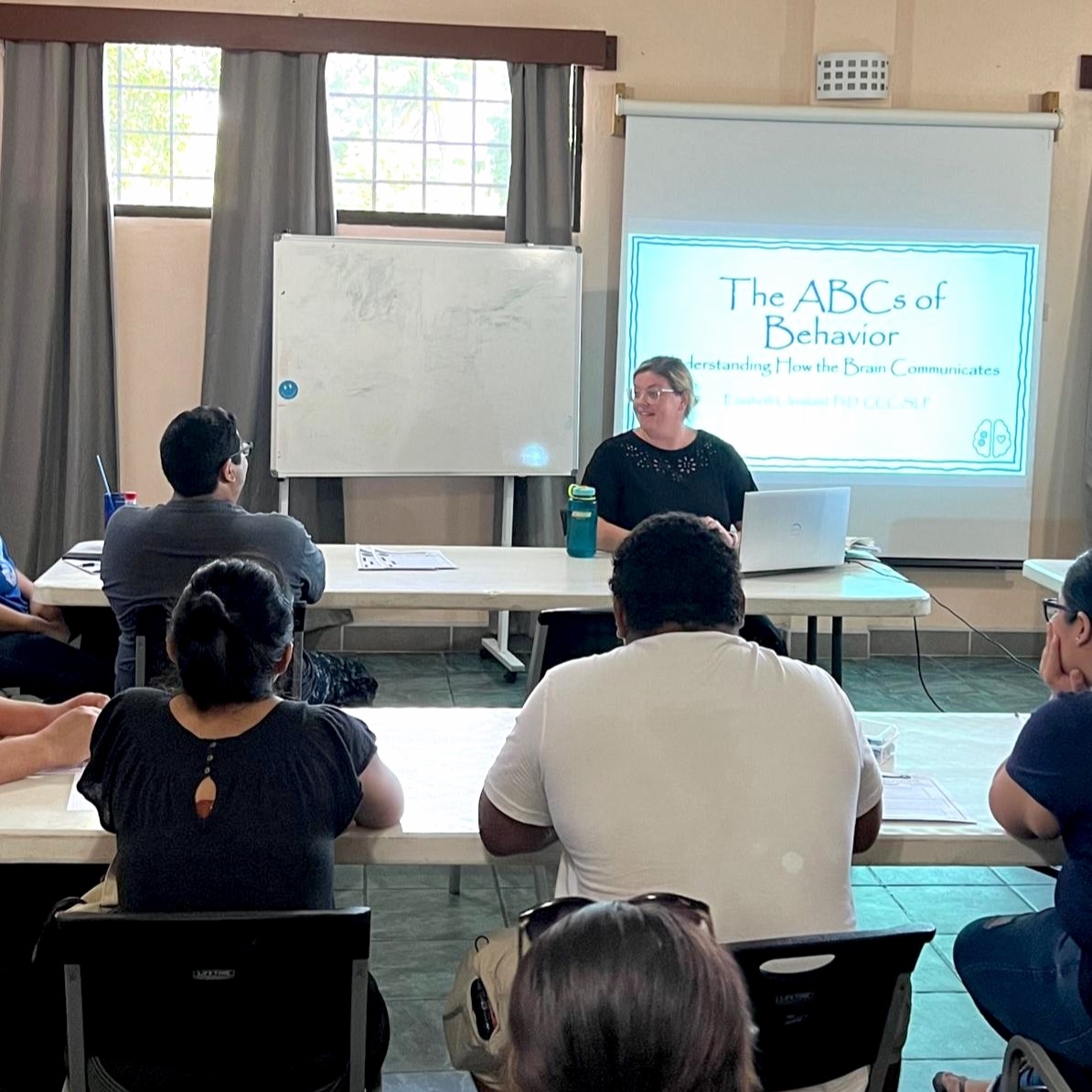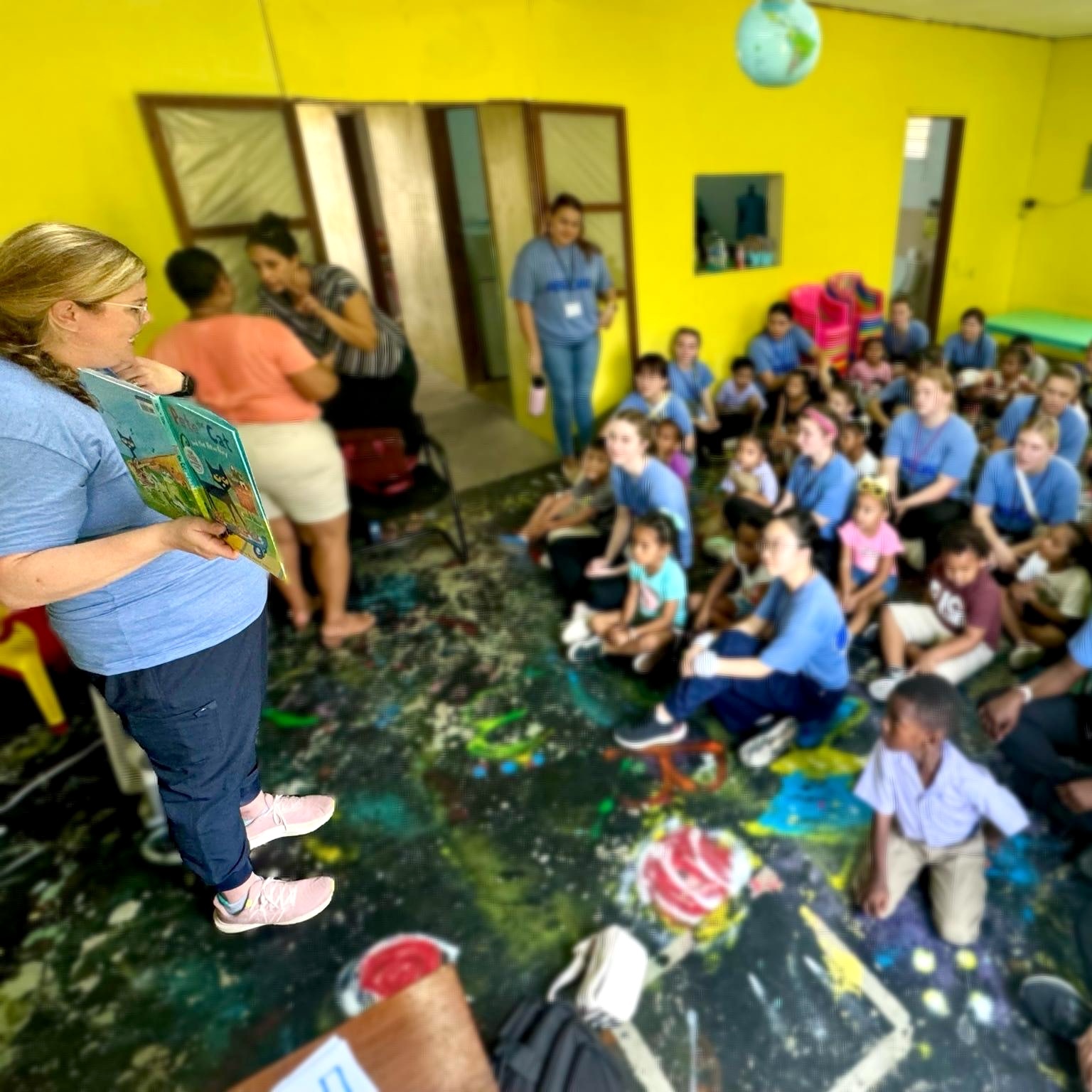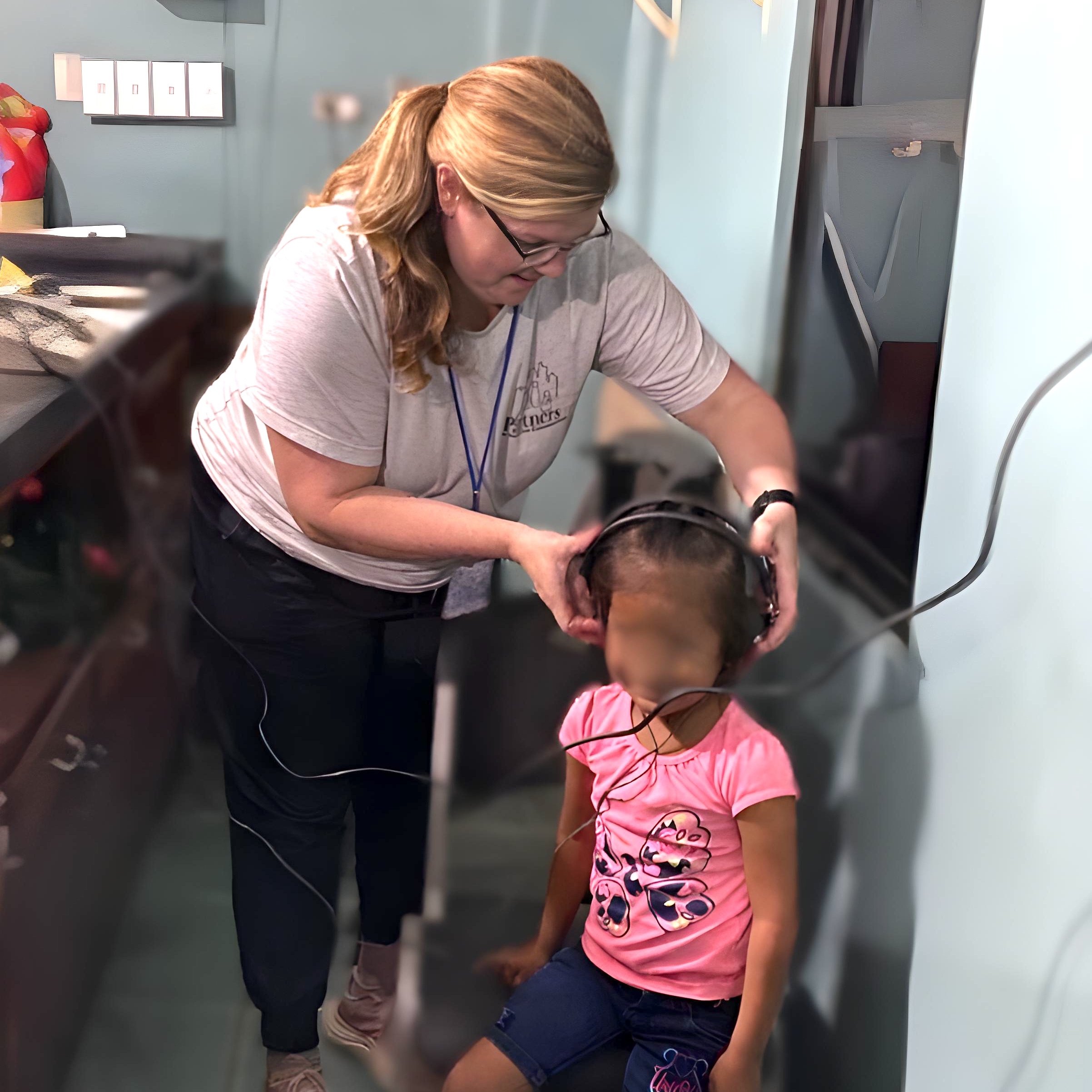Staff Interview with Elizabeth Cleveland
Get to know Therapy Abroad Inc.'s staff!

Elizabeth Cleveland, PhD, CCC-SLP, is the CEO of Fusion Center Network and a trained speech-language pathologist. Her research is in neurodevelopmental disorders, such as autism spectrum disorder. She has traveled with groups of students to Belize, meeting families and providing training.
What inspired you to work with Therapy Abroad?
I originally became inspired to work with Therapy Abroad because the organization combines three of my favorite activities: service, experiencing different cultures, and teaching students.
Therapy Abroad has given me the chance to mentor students by shaping their skills, knowledge, and attitudes, which helps them develop into competent, compassionate clinicians. I can also provide valuable services to areas of the world with limited access to therapy. I can train local communities and professionals, which builds capacity and encourages sustainability in care. I find a true sense of accomplishment when seeing the impact these programs have on students and families.
Describe a typical day at work.
A typical day with Therapy Abroad consists of several activities, including local community tours, classroom-based learning, clinical work with children and adults, networking with students and supervisors, and fun-filled excursions.
At the beginning of a program, students and supervisors are given time to get to know one another through group learning opportunities like planning camps for clients visiting during the week. Students then practice report writing, therapy techniques, assessments, and working with clients and families. And, after the hard but fulfilling work is completed, students and supervisors get to enjoy learning about the amazing communities through exciting local excursions.

Elizabeth Cleveland works with a child at a local preschool.
Why do you do what you do?
I find passion in providing care for families and children with neurodevelopmental disorders. I believe in the transformative power of cross-cultural learning and providing accessible services to communities in need. Working with Therapy Abroad allows me to not only mentor and guide future speech-language pathologists, but also make a tangible difference in the lives of people who might not otherwise have access to diagnostic and clinical care.
The experience of working in Belize deepens my own professional practice and gives students an invaluable opportunity to see how their skills can impact diverse populations in meaningful ways. It's incredibly rewarding to be part of a program that blends service, education, and the opportunity to help people from all walks of life.
What is your favorite part of being a supervisor for Therapy Abroad?
My favorite part of working with Therapy Abroad is seeing students step out of their comfort zones and transform into confident, compassionate clinicians.
Many of the participants we work with have never had the opportunity to engage with clients, travel internationally, or even fly on an airplane. Watching them navigate these new experiences, often with a mix of excitement and uncertainty, and then grow in their self-belief and clinical skills is incredibly rewarding.
It's fulfilling to see this personal and professional growth unfold, and the fact that it happens across students from diverse backgrounds—both from different parts of the country and around the world—makes it even more meaningful to me.
How do you use your education and international background in your current role?
I had the chance to travel internationally several times when I was growing up, which allowed me to develop a love of learning about new places and honoring different cultures. Since then, I have continued to travel abroad and have even planted the "travel bug" into my own children.
I try to instill this love of travel into my students during each international education opportunity while also instilling a love of working with clients and families.

Elizabeth Cleveland presents to local families in Belize.
What challenges do you often face, and how do you overcome them?
Communication is vital to a person's life, but it does not always develop as society expects. Delayed development, or even just a different communication style, can impact many areas of a person's life. Delayed or impaired communication skills are one of the more prevalent challenges I face as a speech-language pathologist. To overcome these, I teach strategies like compensation and skill-building to clients and family members.
What advice would you tell your pre-travel self?
I would advise my pre-travel self to always take the leap when given an opportunity to travel. My skills as a speech-language pathologist have grown during each of my international trips. It can be scary going to a new place, especially with people you don't know, but the experience is totally worth it. I truly believe that traveling has made me a better clinician.
What makes Therapy Abroad special?
Therapy Abroad's unique blend of clinical service, education, and cultural immersion makes it special. Students have the rare opportunity to work in an international setting, providing vital speech-language pathology and other medically-based services to communities with limited access to care.
The program promotes both personal and professional growth, helping students develop as clinicians and global citizens. The hands-on experience, mentorship, and cultural exchange they receive in Belize set Therapy Abroad apart, making it a program beyond traditional education. It’s not just about offering services; it’s about creating lasting impact and empowering the next generation of medical professionals.
Why should students choose Therapy Abroad for international education?
Many things make Therapy Abroad a competitive company:
- They offer exposure to diverse cultural perspectives, which enhances students’ ability to work with clients from varied backgrounds.
- They offer students the opportunity to build a global network of peers, educators, and professionals while learning to honor local communities and cultures.
- They give utmost importance to safety, which is seen in their many awards and accreditations.
These are examples of unique factors that make Therapy Abroad an excellent choice in international education.

Elizabeth Cleveland reads a book to a preschool class and travel abroad students in Belize.
What is Therapy Abroad’s mission and how do you continue to work toward it?
Therapy Abroad creates an interactive educational environment for students and professionals to learn and enhance core competencies in their field, and gain valuable clinical hours while enjoying the richness and challenges of service learning and traveling abroad.
I try to work toward this mission by pursuing continuous learning and staying updated with evidence-based practices. I also build interprofessional skills through participation in local, state, and national organizations, like my membership with a state speech-language pathology and audiology association. I supervise a variety of interprofessional students throughout the year and develop a number of learning materials. All of these things help my continued work toward Therapy Abroad's mission.
What do you hope participants take away from your programs?
I hope participants take away a deeper understanding of the power of service and cultural exchange. Through our program, I want students to gain invaluable clinical experience while developing a greater sense of empathy, adaptability, and global awareness. By working in a diverse and resource-limited environment, they learn how to approach challenges creatively and become more resourceful clinicians.
Most importantly, I hope they leave with a lasting appreciation for the impact they can make, not just as professionals, but as individuals who are capable of contributing to communities in purposeful ways.
If you were a first-time participant in one of your organization's programs, where would you go and what would you do?
If I were a first-time study abroad student looking to participate in one of Therapy Abroad's programs, I would consider Belize.
The opportunity to work directly with local communities and provide much-needed clinical services would be an incredible experience. The fact that English is the national language makes it easier to communicate and build strong connections with the locals, which I find invaluable in a clinical setting. Belizean communities are known for being incredibly friendly and welcoming, which would create a supportive environment for learning and growth.
Additionally, the chance to collaborate with other students and professionals from around the world would expand my understanding of healthcare practices and enrich my professional development.

Elizabeth Cleveland conducts a hearing screening on a child in Belize.
Why is it important for people to travel abroad and experience new cultures?
When we immerse ourselves in different ways of life, we gain a deeper understanding of the world and the diverse people who inhabit it. This helps challenge assumptions, break down stereotypes, and build connections beyond borders. Exposure to new cultures also encourages personal growth, adaptability, and problem-solving skills—all of which are invaluable in both professional and personal contexts. Ultimately, experiencing new cultures enriches our lives, expands our worldview, and deepens our sense of global citizenship.
What advice would you give to individuals thinking about going abroad?
My advice for individuals considering going abroad is to approach the experience with an open mind and a willingness to embrace new perspectives. Be prepared for challenges, as adjusting to a new culture and environment can be difficult but incredibly rewarding.
Take the time to learn about the local culture, customs, and language—this will not only enhance your experience but also help you build stronger connections with the people you meet.
Be flexible and patient, as things may not always go as planned.
Lastly, remember that you are not just visiting a place; you’re becoming part of a global community, so approach the experience with respect and humility.
What does meaningful travel mean to you?
For me, meaningful travel goes beyond simply visiting new places. It’s about engaging with the local culture, connecting with people on a deeper level, and contributing to the community in a positive way. It’s an opportunity to learn, not just as a tourist, but as someone who truly experiences a different way of life.
Meaningful travel involves stepping outside your comfort zone, embracing new perspectives, and using your skills to make a real impact. Whether through volunteering, providing professional services, or just being present and open to new experiences, meaningful travel is about fostering understanding, building connections, and growing personally and professionally.






